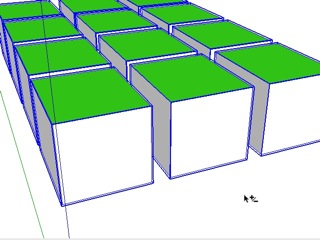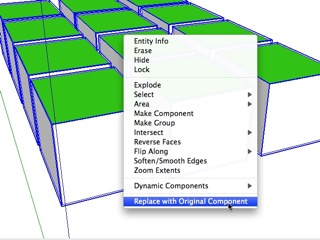Very heavy model.
-
@tiriki said:
I'm trying to render my scene, but the process doesn't go on and appears an error. Could you help me to understand what I'm doing wrong?
Check the 'nesting' of your components.
Having components within components within components of components etc... the 'parsing' time will increase exponentially.In my experience, don't go higher than a 'to the third degree' nesting, or you get in trouble using render engines.
-
@kwistenbiebel said:
Check the 'nesting' of your components.
Having components within components within components of components etc... the 'parsing' time will increase exponentially.In my experience, don't go higher than a 'to the third degree' nesting, or you get in trouble using render engines.
That applies to Podium and other engines as well? Not just V-Ray?
-
In my experience, yes.
Skindigo, Maxwell, Fry, Vray, Podium....all of them.
I am not sure how the exporters are written, but they seem to have that in common. Do they all do a camouflaged .3ds export?Fully exploded models tend to export the fastest (except when using 'instancing methods' as Fry, skindigo, Maxwell and Kerkythea more or less can)
-
Are those plants that are next to the house? If so they may be your problem. In one of my last projects I had a building that had planters everywhere, and green walls also. Needless to say I had a lot of high quality, high poly plants everywhere. The only way I could manage the model was to have all the plants on one layer, so I could turn that layer off, and by creating a scene that had shadows off, and plants off, and in my case some other high poly objects off, it allowed me to be able to work on the model without the redraw time lag.
-
I think kwistenbiebel's toptip about not going nuts with nesting is a good one. Not particularly from a technical standpoint - there is no reason why a 3 nested model works but a 5 nested does not - but because its deceptive just how much geometry you're generating by adding a top level with many nested parts.
One thing I added to my stuff is a Context (right-click) menu that will flip any component to a bounding box proxy component. So you can select your toplevel nested components and flip them into box proxies for positioning and fast navigation but they get rendered using the original geometry. The flip is pretty much instant (unlike exploding) so it doesn't break the workflow.
So if I highlight all my top level complex nested components, it looks like this:

Then I can orbit/navigate really fast using simple proxies

And to flip back to the original geometry

Adam
-
Cool trick Adam, is this an available ruby or one of your personal ones?
-
Thanks.
No, its part of that glorious LightUp plugin..

-
Cool feature for sure. Another reason to at least try it out!

-
Any chance of making it a seperate commercial ruby?
Mike
-
Hi Tiriki, hi folks.
@tiriki said:
Hi everyone!
I pull up this discussion because I have the same problem... my model is too heavy (86 Mb) and it takes too much time to save and open... also I have some difficulty to go around into the model whit the orbit tool.
Are only the texture that cause this problem? I tried to explode some components and groups and I pourged the model, but the file became heavier (94 Mb).
Do you have some suggestion for me?
Thank's

To speed up orbit, pan, zoom, etc with a heavy model, try to show as little of the geometry as you can before using these tools. Then, when done, show all that want.
For example, I would use "Shaded" viewing mode instead of "Shaded with textures" or even "Wireframe" for more extreme cases. I would also set the profiles to 1 pixels instead of 3 (default value). I would set shadows to off. I would hide as many elements as possible, using layers made invisible and, of course, assigning the unneeded geometries to these layers. Etc, etc. Everything that requires computing power from the graphic engine would be minimalised.
Then, I would create a scene and uncheck the "Camera location" from the items to update. This in order not to affect the actual view. Lets call this scene "Work".
Then I would create another scene where all the wanted elements would be visible, the shadows on, if needed, the profiles at 3 pixels or whatever you want. Etc, etc, required for the nice view that you want. Again, I would make sure to uncheck the "Camera location" to avoid loosing a carefully defined view. Lets call this scene "Render".
Then the workflow becomes:
1 - Click on the scene tab for "Work".
2 - Orbit, pan, zoom to set the view as you want it. Since there is very little to show, the actions shall be fluid.
3 - When done, click on the scene tab "Render". It should not take too long for the image to improve with all hidden stuff now shown, etc.
Just ideas.
-
@alpro said:
Any chance of making it a seperate commercial ruby?
Mike
Sure. I'll need to get some feedback from LightUp users first - and get the next version out too! But after that, I don't see why not.
Adam
-
@adamb said:
Thanks.
No, its part of that glorious LightUp plugin..

Adam,
You may recognize my name from the LU Forum (I'm the one having all the problems with LU freezing the SU window).
My real question here is: where in LU is the proxy plugin that give the right click "Replace with Proxy" command? If I can ever get LU to work, this proxy capability would be a handy tool since most of my models are "heavy". -
@adamb said:
My real question here is: where in LU is the proxy plugin that give the right click "Replace with Proxy" command? If I can ever get LU to work, this proxy capability would be a handy tool since most of my models are "heavy".
Its part of LightUp v1.5 which out in a few weeks.
However, in LightUp you have always been able to place a Component with a definition called "XYZ**_proxy**" and LightUp will replace it with the Component Definition called "XYZ". I've just added an easy UI to the functionality for v1.5
Adam
-
Posted the LightUp version here a little later than planned.
Adam
Advertisement







